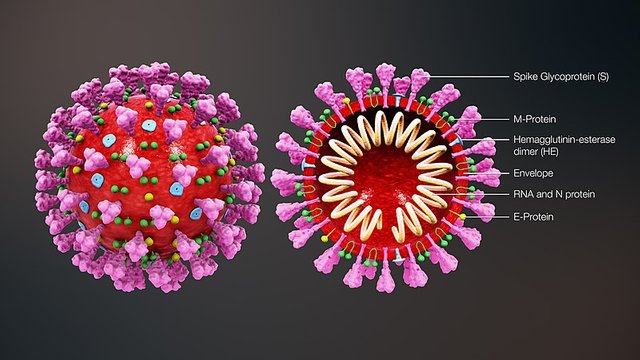
This is a pre-print publication of a metaanalysis of the scientific literature in the background of emerging infectious diseases like the Coronavirus Infections of 2019-nCoV-Wuhan Virus
Author: Cord Uebermuth - published on Februar 3, 2020 - 21:20 UTC on steemit.com as a preprint on the blockchain
Abstract
Background
The outbreak of the Wuhan-2019-nCoV-Coronavirus as a pandemic risk to mankind to mankind is pointing out again a significant lack of available and effective antiviral therapies against emerging infectious diseases in the background of unavailable drug therapies in the present in order to treat serious conditions of infected patients which are able to cause multi-organ failure an death. Endosomal pharmacotherapy has not yet been established in the the medicine or in the clinic as a potential antiviral treatment opportunity and isn´t part of the training of students, doctors and pharmacologists.
From the point of view of the author of this work, the lack of knowledge about pharmacological intervention options at the level of cell organelles therefore leads to unnecessarily high casualties in the outbreak of dangerous human-pathogenic emerging viral diseases like the current nCoV-outbreak in China. The aim of this work is to introduce a new field of pharmacotherapy to the medicine and clinical routine which is focused on the endosomal pharmacological treatment of cells in human beings in order to prevent increased multi organ damage and causalities in outbreak situations like a viral SARS-pandemic or the current nCoV-outbreak in China.
Methods:
To clarify the question of new drug therapy options for the treatment of the 2019 nCoV virus and other emerging viral disease, a literature search was carried out on google and the databases of pubmed and NCBI. The following search terms were used, inter alia: "Coronavirus, nCoV, virus, gp120, gp41, fusion, endocytosis, s-protein, SARS, endosom, cell, therapy replication, inhibition, pharmacotherapy, and many others.
The search and scientific review of this article even included publications and dissertations about viral infections of different coronaviruses and Lassavirus infections and and was supplemented by a literature search in the magazine of the medical library of the Heinrich-Heine University Düsseldorf
Results:
The majority of viral infections of mammalian cells occur as class 1 clathrin-dependent fusions of the Coronavirus with the host cell via endocytosis.
Through targeted pharmacological changes in the cell environment within the cell organelles of the host cell, in the case of coronavirus infections, a loss or at least a significant reduction in the infectivity of coronaviruses can be achieved. The inhibition of the fusion of the viruses with the host cell is often subject to complex structural changes in the viral fusion proteins cell interaction, which, for example in the case of coronaviruses investigated to date, reduce or even completely inhibit the viral fusion activity by changing the pH in the various maturity stages of the endosomes and viral nucleocapsids in the context of endocytosis of virus particles. Through the use of lysosomotropic substances, such as chloroquine or the highly toxic bafilomycin, it is possible to prevent the replication of coronaviruses at the endosomal or postendosomal level in vitro by pH changes within the endosomes which are used by viruses for endocytosis and thus to combat replication which use the class 1 clathrin-dependent entry mechanism into the host cell.
The cationic amphiphilic drugs amiodarone and chlorpromazine may be considered as possible off-label therapies as further therapeutics which are potentially effective against coronaviruses and which block the fusion of the Coronavirus with the host cell within the framework of an endosomal pharmacotherapy which should be established.
For chlorpromazine, an almost complete inhibition of the infectivity of the coronavirus has already been shown in the MHV-A59 coronavirus in vitro, which is based on the APT-2 mediated blocking of the endocystosis of the coronavirus.
However, it has not yet been researched why the increase in pH in the frame of an endosomal pharmacological influence on the cell environment reduces and blocks the fusion activity of coronaviruses.
Finally, based on the scientific knowledge to date, it seems likely that the endosomal pharmacological influence on the environment of human cell organelles - especially the endosomes - is suitable in the case of infections with new and dangerous virus strains, as well as pandemic agents, suitable for initiating highly effective antiviral therapy for infected people.
Such novel therapeutic approaches for inhibiting viral fusion activities should initially be carried out as part of clinical studies and require interdisciplinary monitoring with regard to potential side effects.
Keywords: coronavirus, nCoV, SARS, Ebola, Lassa, viral replication, viral fusion, cell, endosome, endosomal pharmacotherapy, inhibition, virus replication, chloroquine, amiodarone, chlorpromazin, Bafilomyin, s-protein, viral spikes, hiv
All right reserved.
Posted via Steemleo
Keine Kommentare:
Kommentar veröffentlichen
Hier können Sie ihre Meinung mit anderen Nutzern des Portals austauschen. Um Spam und Werbung sowie themenfremde Beiträge zu vermeiden werden Kommentare erst nach Freigabe und Moderation veröffentlicht. Vielen Dank.